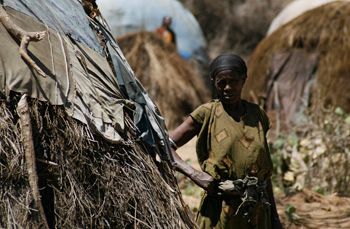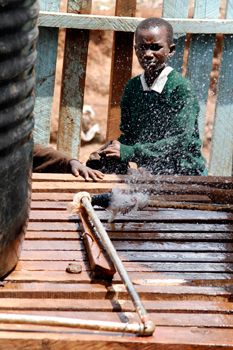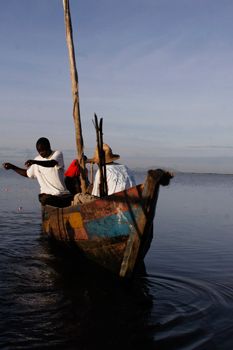Water is the new oil.
I’ve spent the last four months reporting stories on water from Ethiopia and Kenya, two countries at the forefront of the world’s coming water crisis. And while Western politicians and consumers fret over the declining economy and increasing oil prices, the news from East Africa is that with a growing majority of the world living on less than a dollar a day, the liquid that fuels bodies is becoming even more contentious than the liquid that fuels cars.
Our team uncovered distressing stories about people in the region facing water scarcity issues: women who walk for miles each day to collect drinking water; farmers pushed into deadly conflict with wildlife by dwindling river flows; city water supplies drained by overzealous irrigation. But the big picture that the smaller stories hint at is one of ecological disaster and conflict over resources that will affect millions and have repercussions around the world. As disturbing as it was to see the harsh realities of this crisis come in to focus before my eyes, equally upsetting was the realization that there is no journalistically viable way to write and publish that larger story.
Africans’ struggles for water inevitably read to American audiences as happening “over there” in a chaotic and distant world. Connecting them to a looming global trend requires a prescience that doesn’t hold up to the exacting principles of print journalism. This is especially true because developments on the ground often outpace the scientific community — in many neglected areas, for example, the only way to find out if rainfall has been declining is to ask a subsistence farmer, because the formal scientific data simply doesn’t exist.
I’ve made the mistake in the past of being too timid to put something I felt strongly about in print because I didn’t have the sources or the clout to back it up. I can vouch for the fact that being able to say “I could have told you so, but I didn’t” after the fact doesn’t provide much satisfaction.
In fear of repeating the same frustrating experience again, and in faith that we can still mitigate this disaster, I’m offering the story behind the story on the coming world water crisis here. Off the record.
“As you may know, Alex, the coming World War Three will be fought over water, not oil.”
The director of a local water NGO told me this just a few days after I arrived in Ethiopia in January. Variations on that refrain were echoed by aid workers and researchers across the region over the next several months.
The fringes of Ethiopia’s fertile highlands are dotted with camps housing refugees from water-based conflict in the rest of the country.
A few kilometers outside the ancient Muslim city of Harar, alongside a dry riverbed, lies one such camp of 5,000 ethnic Somalis. They were driven from the Ogaden region by inter-clan conflict over access to water and pastureland. The camp is a sprawling expanse of small, wood-framed domes covered with a patchwork of plastic and other scrap material, the only material families could scavenge to shield themselves from the incessant beating of the equatorial sun.
These people lost all the livestock that were their livelihood, as well as many of their family members, to the conflict, and they now survive on the meat of cacti and occasional handouts from the locals. In recent months that hospitality has begun to wear thin as well.
To get the water they need to drink and wash, they dig into the sandy bottom of the dry riverbed until they’ve scratched deep enough to reveal the muddy water that flows beneath.
The elders of the village earnestly described their situation to me, asking hopefully if I knew anyone who could help, but even then I suspected that their story wouldn’t ever find its way into print. After all, the scale of their tragedy couldn’t compare to other African conflicts that are making the news, and there wasn’t any element of geopolitical intrigue here — just poor people fighting over water. I cursed myself for not thinking to at least bring a flat of bottled water when we came to visit the camp.
But taking a broader view, I later realized that the scale of this story is massive. Refugees from similar conflicts over access to shrinking water and pastureland are scattered across southern Ethiopia and northern Kenya.
Pastoralists are especially vulnerable to climate change because they already live so close to the margins, dependent on grazing their cattle and camels in areas where agriculture isn’t viable. A small decrease in rainfall can be a death sentence for animals if sparse watering holes go dry. But most herders are already armed against predators, and will sooner clash with other groups to get access to water than stand by and watch their animals die.
“Some of us will be alive to see it happen.”
That’s what a Ugandan environmentalist told me about the nightmare prospect of the world’s second-largest lake drying up completely.
Lake Victoria’s levels have receded by several meters in recent years, destroying the breeding grounds for fish, endangering the 30 million East Africans who live around the lake, and setting the stage for international conflict.
Kenyan fishermen chasing fish into deeper Ugandan waters have been arrested and allegedly tortured by Ugandan military. Fishermen from the two countries have also clashed with one another directly.
In addition to rising temperatures, decreased rainfall and watershed deforestation, scientists and fishermen alike blame new hydroelectric projects at the source of the River Nile in Uganda from draining too much water out of the rapidly shrinking lake.
Motivated by desperation or revenge, Kenyan fisherman in the shallows don’t hesitate to harvest baby fish, sealing the future fates of the fishermen from all three countries who share the lake.
Without international cooperation on plans for conservation, this sort of tit-for-tat race to exploit resources faster than your neighbor will ensure that Lake Victoria will end up like other devastated bodies of water, such as the Aral Sea and Lake Chad.
But international conflict over the water resources of the Lake Victoria/Nile River system seems almost inevitable. The nine countries that share the system (Egypt, Ethiopia, Sudan, Tanzania, Kenya, Uganda, Burundi, Rwanda and the Democratic Republic of Congo) are some of the world’s poorest nations and their populations are exploding, exponentially increasing stress on endangered water resources.
Just as Kenyan farmers are decreasing inflows into Lake Victoria by cutting forests in its watersheds, the Ugandan government is increasing outflows by running more water through its new dams into the Nile. Just as Ethiopians are pushing to industrialize their agricultural sector for export, putting new land under irrigation, hundreds of miles downriver, Egypt is channeling millions of gallons of water out of the river to “reclaim” vast swaths of desert.
While any of these issues alone might get attention in the local, or even international press every once in a while, the world seems to have averted its eyes from the combined threat to this massive ecosystem.
With the current regional population of 387 million on course to double in the next 30 years, the equation of available gallons of water from this system just doesn’t add up. Movements for international cooperation, like the Nile Basin Initiative, have yielded some promising results, but in a corner of the world already fraught with tense rivalries, control over the most basic human resource is almost certain to be an impetus for violent conflict.
For Americans, environmentalism has traditionally been a misanthropic affair.
We're primarily concerned with preserving natural beauty for its own sake and protecting nature from the advances of civilization. But in East Africa, itself home to an impressive environmental movement, environmentalism is inseparable from humanitarianism. Here, when ecosystems are destroyed, people are almost always directly harmed as well, even if they are the ones doing the destroying. The experiences of Africans struggling to find fish in Lake Victoria or fighting over dwindling pastureland for their livestock in Ethiopia might not seem like particularly important stories for small-town American news audiences. But even ignoring the direct contribution Americans may be making to these distant problems in the form of climate change, these small stories are relevant to us for what they tell us about the big story that usually goes untold — the story of the entire planet as an ecological whole. When violence over access to basic resources like water erupts among people who depend directly on the earth for their survival, it is an important reminder. Despite the distinctions we’ve imagined between the survival of the natural environment and our own prosperity, the health of the earth and the health of humans are one and the same.







